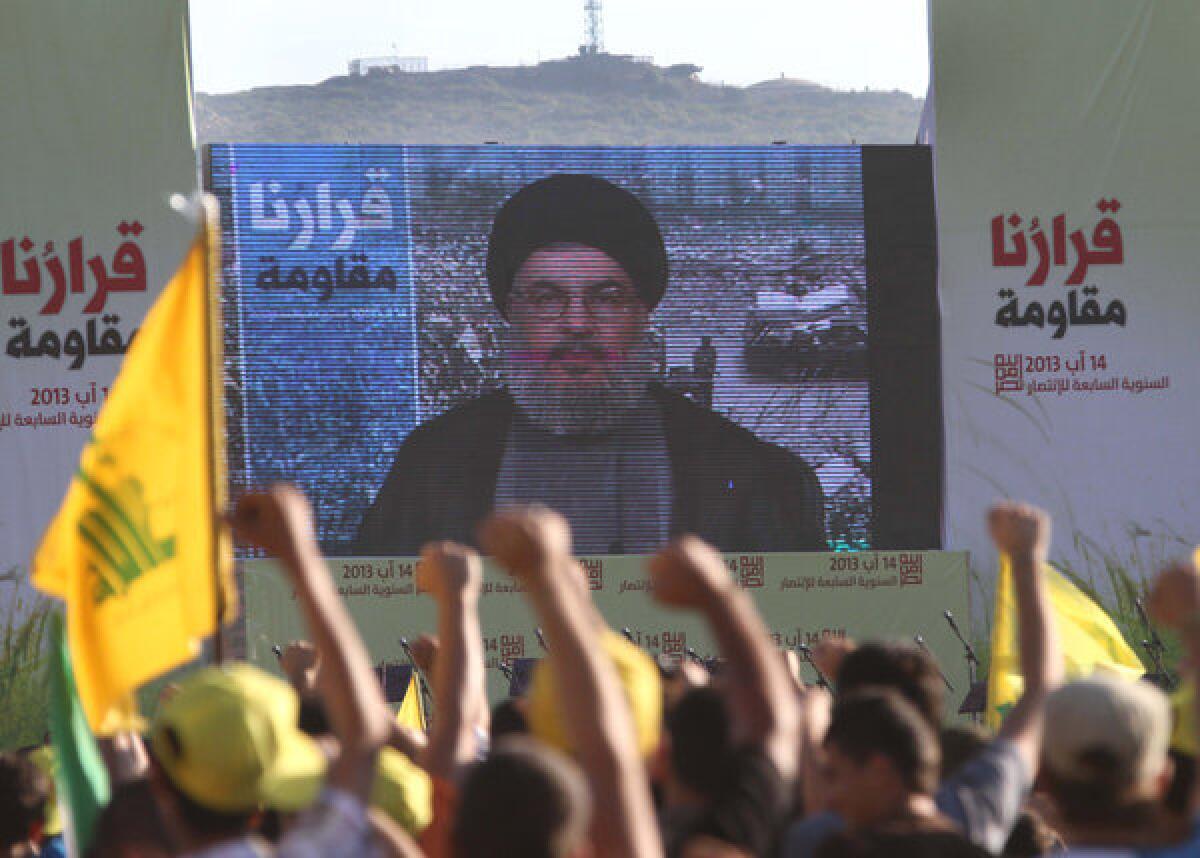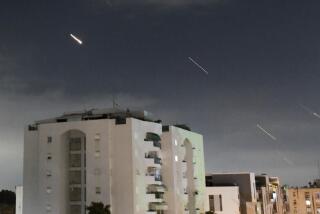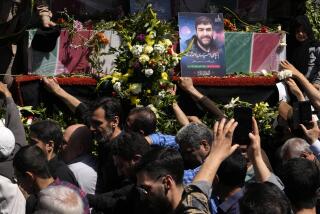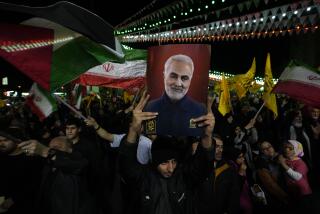Hezbollah’s Hassan Nasrallah vows to avenge attacks against followers

BEIRUT — The leader of Hezbollah on Friday vowed that its fighters would retaliate against “terrorists” who have detonated car bombs and launched other attacks against neighborhoods and individuals allied with the Lebanese Islamist group.
“To the killers: Our hands will reach you,” Hassan Nasrallah, Hezbollah’s general secretary, said in a speech carried via satellite link to thousands of supporters in a village in south Lebanon near the Israeli border.
It appeared to be first time that the leader of the political, paramilitary and social service group had vowed to avenge the recent spate of attacks targeting Hezbollah sympathizers. Nasrallah also said Lebanese authorities were investigating the cases and that some suspects had been identified.
In his animated address, the Hezbollah leader also said that if needed Hezbollah, which the United States has labeled a terrorist organization,
would double the number of militiamen it has sent to Syria to fight on the side of the government of President Bashar Assad.
“If we have a thousand fighters in Syria, they will become 2,000, and if we have 5,000 fighters in Syria, they will become 10,000,” Nasrallah declared, drawing loud cheers from the crowd watching him on a giant screen. “And if the battle with those terrorists requires it, I and all of Hezbollah will go to Syria.”
In his address, he provided no specific figures about how many Hezbollah fighters have been sent to Syria.
Nasrallah spoke a day after a powerful car bomb exploded in a Hezbollah stronghold in a southern Beirut suburb, killing at least 21 people and injuring almost 300.
The bomb, apparently placed to cause maximum carnage among civilians in the bustling district, was the latest and deadliest in a series of strikes that appear to be targeting Hezbollah enclaves, apparently in retaliation for the group’s support for Assad.
Hezbollah’s intervention has enraged the Syrian opposition, which has demanded that it withdraw its forces. Some militant Sunni Muslim groups have reportedly threatened to strike at Hezbollah in its Lebanese base because of its role in Syria. Supporters of Assad have defended Hezbollah’s intervention, pointing out that thousands of non-Syrian militants from throughout the Arab world and elsewhere, some linked to Al Qaeda, are among the rebel forces fighting to oust the government.
The Hezbollah chief implied that the attacks on Lebanese soil, including Thursday’s car bombing, were the handiwork of “Takfiri” radicals, referring to Sunni militants who target Shiite Muslims and others considered apostates. Hezbollah is a Shiite organization. Sunni rebels are leading the rebellion against Assad, a longtime ally of Hezbollah.
Though he pointed at Sunni militants in the attacks, Nasrallah also said he did not rule out a link to Israel, Hezbollah’s enemy. Israel has denied any role in recent attacks targeting Hezbollah sympathizers in Lebanon.
The Hezbollah chief’s address Friday marked the anniversary of the end of Hezbollah’s 2006 month-long war with Israel. Hezbollah calls the conflict a victory, though others say the ending was inconclusive.
In an interview this week with Al Mayadeen TV, a pan-Arab channel, Nasrallah said that the Syrian military had provided arms, including Syrian-made rockets, to Lebanon before the 2006 conflict with Israel. The Hezbollah chief also said that Assad offered to bring Syria into the war on Hezbollah’s behalf, but the offer was declined because further Syrian assistance was not needed.
In his speech, Nasrallah warned that those targeting Hezbollah were leading Lebanon down a hazardous path.
“These groups wish to take Lebanon to destruction and to civil war,” he said. “It is necessary to stop inciting sectarian conflict. Let the conflict remain political.”
The bombing Thursday stunned a nation that is deeply divided about the war in Syria and the role of Hezbollah, a major political and military force in Lebanon. Many worry that fallout from the Syrian war will destabilize Lebanon’s fragile democracy. Lebanon emerged from a 15-year sectarian-fueled civil war in 1990.
The bombing caused extensive damage to several multistory apartment buildings and nearby businesses, with flames engulfing cars and structures.
Authorities were seeking to determine whether the explosives-laden car had been driven by a suicide attacker or detonated remotely.
ALSO:
Clashes spread across Egypt; more than 60 reported killed
4 bodies found in sunken India submarine as search goes on
Yelena Isinbayeva says she was misunderstood on Russia’s anti-gay lawpatrick.mcdonnell@latimes.com
Bulos is a special correspondent.
More to Read
Start your day right
Sign up for Essential California for news, features and recommendations from the L.A. Times and beyond in your inbox six days a week.
You may occasionally receive promotional content from the Los Angeles Times.







